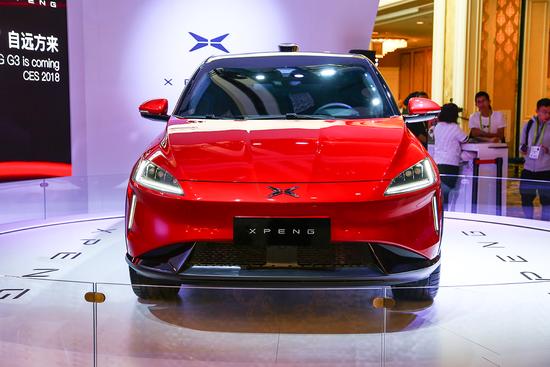(Original title: Exclusive | Xiaopeng Motors to Complete a New Funding Round in January) Li Refractory Several internet-based electric vehicles, including the Xiaopeng G3, Weilai ES8, Weima EX5, and Betta Concept, have made their way into the market. During an interview with the First Financial Journalist at the 2018 International Consumer Electronics Show (CES), He Xiaopeng, Chairman of Xiaopeng Motors, discussed the emergence of new internet carmakers since 2014. He mentioned that several pioneers, including Peng Motors, are set to deliver small quantities of cars in 2018, facing initial challenges such as quality, differentiation, and organizational systems. However, he emphasized that this is just the beginning. The real test will come in 2020, when the industry will be put to the ultimate challenge. At this year’s CES, Xiaopeng Motors launched its first mass-produced model, the G3. This marked the first time a Chinese internet carmaker released a mass-produced version at the event. He Xiaopeng highlighted that the "face" of a car is becoming increasingly important—this is a time for visibility. The G3 represents version 2.0 of Xiaopeng's product line, featuring improvements in value, range, reliability, and the first Internet car to incorporate a cockpit-style interior. When asked about competition from companies like Weilai and Weimar, He Xiaopeng said it’s positive that many new players are working together in areas like new manufacturing and mobility. However, Xiaopeng aims to create a unique kind of internet car tailored for young, tech-savvy, and fashion-conscious users. He is focused on how Xiaopeng can stand out by emphasizing its Internet DNA and distinct identity. “Corporate culture and taste are deeply tied to the founders and the team,†he said. “I am a product-driven person, focusing on user experience and organizational structure.†Founded in 2014, Xiaopeng Motors started its journey with the development of “Three Electricity and One Screen†(motors, batteries, electronic controls, and central control screens). In early 2015, they began R&D on core systems for internet-connected vehicles. In September 2016, they released a beta version of their prototype, followed by the first production prototype in February 2017. Over 100 prototypes passed rigorous testing. Through a partnership with Haima Motors, Xiaopeng used Haima’s production license to launch its first vehicle in October of last year, becoming the first Chinese internet car company to achieve mass production. In terms of production methods, Xiaopeng differs from Weilai and Weimar. While Weilai seeks multiple partners and Weimar has built its own factories, Xiaopeng announced in May last year that it would invest 10 billion yuan in Zhaoqing, Guangdong, to build a large-scale production base covering 3,000 mu. The first phase, expected to cost 4 billion yuan, is scheduled for completion by 2019, with a planned annual production capacity of 100,000 vehicles. Shen Hui, CEO of Weimar, believes that the automotive industry is highly precise manufacturing, and while the OEM model saves costs, it limits direct control over quality details. He Xiaopeng, however, takes a different view. He argues that it depends on the timeline. For over 30 years, China’s auto industry has followed a model of overseas design, domestic production, and sales. While overseas firms control design, R&D, and supply chains, domestic production can only manage quality to a certain extent. He believes that when Chinese companies integrate the full chain of R&D, design, and production, quality assurance becomes more comprehensive. He Xiaopeng also noted that the automotive industry is complex and involves multiple stages—from design and R&D to brand marketing and production. Each step carries significant risk, and entrepreneurial companies must focus on reducing complexity and managing risks through strategic partnerships. Xiaopeng is working to balance between relying on partners and building its own factories, ensuring control over detailed parameters and process requirements. The automotive industry is capital-intensive, technology-driven, and requires long-term commitment. Since Tesla was founded in 2003, it has not yet faced the financial pitfalls many startups encounter. For new entrants in the auto industry, success requires not only courage and passion but also long-term preparation. Currently, Xiaopeng’s financing is progressing well. He Xiaopeng revealed that he expects to complete a new funding round in January. Earlier reports suggested that Alibaba may continue to support the round. Xiaopeng is preparing thoroughly for the next stage, focusing on senior management, team building, R&D, manufacturing, and brand development, ready to face the real test of the market in 2020. Door Contact Switch,Contact Switch For Door,Magnetic Door Contact Switch,Normally Open Door Contact Shanghai Janetec Electric Co., Ltd. , https://www.janetecelectric.com